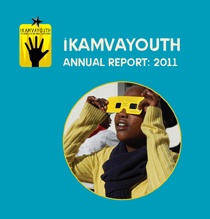

IkamvaYouth’s 2011 Annual Report is out and available here for download!
Many thanks to our super-talented designer Lynne Stuart, to Julia de Kadt for proofreading, and to everyone who contributed stories, quotes and photos. We love it, and hope that all the readers will too!
Ikamvanites got through some really rough times in 2011: our office was petrol-bombed, a devastating fire in Masiphumelele destroyed 1000s of homes, and learners spent a week rioting after their classmate was badly injured while beaten at school. 2011 was also a year of tragic loss: three heroes (Mphumzi Klaas, Nomzamo Kali and Dave Eadie) all passed away before their time, but not before they’d each made significant contributions to IkamvaYouth and South Africa at large.
There were some good times too: 560 ikamvanites (learners & volunteers) spent their holidays at one of the five winter schools (hosted by TSiBA, UWC, Masi library, DUT and SEF), and 426 learners achieved more than 75% attendance, three times a week, through all four terms. 100 tutors regularly spent their spare time tutoring at the five branches. The ikamvanites’ hard work paid off: 99% of learners in grades 8-11 passed onto the next grade, and 85% of our matrics passed (41% Bachelor, 39% Diploma passes). 69% of matriculants are at tertiary institutions, and 9% are in learnerships and/or employment.
IkamvaYouth’s track record of impressive results has led to some important and exciting attention. We were visited by the Minister of Basic Education (twice!) and mentioned in her budget speech; the Duchess of Cornwall popped in, and Jonathan Jansen inspired our learners at the Masi branch. We were featured in national media including Business Day, SAFM and SABC2 and MNet, made our own Live magazine, went to Slovenia and won a bunch of awards.
A key organisational objective for 2011 was consolidation, and despite the challenges, we’ve managed to achieve this; thanks to the support from our visionary donors. We ran our first-ever national strategic planning week (when many of us met the colleagues with whom we collaborate online on a daily basis in person for the first time); open-sourced our model through the ikamvanitezone (where you’ll find shared information and resources, how-to guides, tools & templates); had an independent evaluation conducted by Servaas van der Berg and his team of education economists, and grew our team.
Over the past year, IkamvaYouth has received 28 requests from communities in all provinces to establish more branches. And after our year of heads-down consolidation, we’re ready to step up and respond. 2012 has seen two new branches established: African- Bank-funded Ivory Park and ABI-funded Umlazi. Next on the horizon are Grahamstown and another two Gauteng branches. We’ve also begun thinking about ways to generate income and sustainably scale expansively, without entirely relying on donor funding in the future.
Ultimately though, IkamvaYouth’s sustainability lies with the ikamvanites. During our first few years, people would often tell us sagely that “initiatives that rely completely on volunteers aren’t sustainable”. We don’t get that anymore. And indeed, ikamvanites have shown that not only is the model sustainable due to the learners becoming tutors, and the tutors being so committed, but that volunteers produce results in contexts where few can.
We invite you to get involved in whatever way, and be a part of the change we need in many more communities throughout the country.
We hope you’ll enjoy the 2011 Annual Report multi-media experience we’ve curated for you, and make the most of the hyperlinks providing detail behind the headlines to youtube clips, blog posts and reports.
Thanks again to every indivdual who played your part in enabling all that was achieved and overcome in 2011, and to those who’re boosting us to ramp it up for 2012!

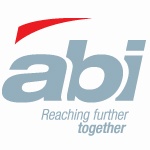
Funding from major corporate companies is always welcomed by organizations such as ours, as it means we can continue serving the communities we work in, in the best way we can. It is however so humbling and indeed encouraging when the employees of that company demonstrate a genuine interest and willingness to participate actively in their company’s social investment initiatives. ABI, is such a company, as demonstrated in the past few weeks.
On the 28th of June, ABI hosted a media launch, formally opening the doors of the new branch in Umlazi, which began operations in April this year. We were invited as honored guests at the event, which was quite exciting as we got to meet with various members of the mangement team, and had an opportunity to learn a little more about this amazing company.
ABI’s involvement in our winter school cannot go unnoticed. The day after the launch, ABI employees joined learners for their sports day, eagerly participating in all the events and getting to know the learners. ABI also got involved in our careers day, aimed at introducing learners to various career possibilities. The CSI team have been amazing, providing refreshments at these events, sponsoring t-shirts and water bottles for all the learners, as well as providing sound and sports equipment for the sports day.
As Tumi (Corporate Affairs Manager at ABI), said in her speech at the launch, “ABI does not just talk the talk, they indeed walk the walk”. ABI’s involvement in these few weeks is testimony to that. IkamvaYouth kzn is indeed privileged and honored to be partnering with not just a major company, but a team of individuals dedicated to the upliftmet of others!
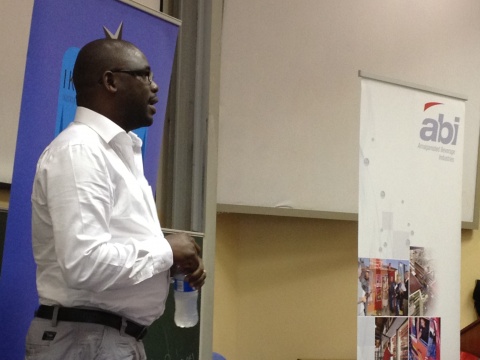
Samkelo Nkosi speaking at the Careers Day

The ABI truck that provided entertainment and refreshments throught the day on Sports Day.
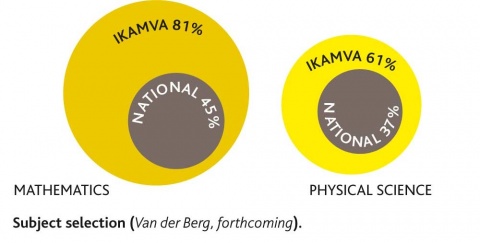
IkamvaYouth is pleased and proud to announce the publication of Against the odds: An evaluation of the IkamvaYouth programme, by a team of economists at the University of Stellenbosch. Servaas van der Berg and his team conducted an in-depth evaluation of IkamvaYouth, by administering questionnaires and interviewing 828 ikamvanites (past and present).
The full report is available here for download, and contains a wealth of information, results, analysis, quotes from ikamvanites and recommendations for improvements and scale.
Some of the findings have validated the results we’ve reported via our own tracking (see below). However, there were also some new and interesting findings, including:
- Insight into ikamvanites’ wealth and living standards
- Only 38% of ikamvanites live with their parents; 45% sometimes go to bed hungry; only 31% have their own desk or table at home and 65% have their own bed.
- 22% of mothers have matric and 11% have some post schooling
- 15% of fathers have matric and 9% have some post schooling; 32% of fathers’ education levels are unknown
- Matric results as compared with those of our feeder schools
- Detail regarding learners’ choosing Maths and Science and their performance in these most-challenging subjects
- “An overwhelming majority (81%) of Ikamva students in 2011 elected to do Mathematics, versus less than half of all candidates nationally. For Physical Science too, far more Ikamvanites chose this difficult option. Reponses to the survey indicate that similarly high proportion of former Ikamva students had elected these two subjects: 78% wrote Mathematics and 54% Physical Science.”
- “The difficulty of these subjects can be gauged from the fact that nationally, the pass rate (at 30%) is 46% and 53% for these two subjects respectively, much lower than for other electives such as Geography (70%) or History (76%), despite the fact that the candidates in these first two subjects are a far more select group in terms of academic ability. This ambitious subject choice is even more exceptional when compared to learners from similar (mainly township) schools. Ikamva’s encouragement of learners to take these more difficult subjects necessarily affects the relative pass rates and the subject performance of Ikamva learners negatively, thus the need to carefully consider this when evaluating Ikamva learners’ results.”
- “61% of all Ikamva matric candidates wrote and passed Mathematics, as against only 21% for all South African matric candidates.3 The proportion of all Ikamva matric candidates who achieved 40% or more was 28% versus 14% for all South African candidates. Compared to similar communities the Ikamva performance in this regard would even be more impressive than this.”
- ” What Ikamva thus successfully manages to do is to encourage learners from across the ability spectrum to raise the bar, by entering for subjects which the typical student from weak schools would usually avoid, and then to achieve success which is at least comparable to that achieved by candidates that often are more selected in terms of ability and from higher socio-economic groups. This is a truly impressive achievement.”
- The good results are consistent: “average results differ little between branches”
- The programme is very highly regarded by our learners and ex-learners (they do tell us these things, but it means a great deal more when told to independent evaluators)
- “The evaluation team is confident that Ikamva’s short term impact is considerable. This lies not only in the improved matric performance, but even before that in helping to create an environment where children from often very disadvantaged circumstances feel a sense of belonging and that someone cares about their needs and ambitions. That alone is a very valuable contribution. The extent of this contribution cannot be measured, but is visible in the fact that Ikamva was so highly praised by all who participates in it, or have done so in the past. As an evaluation team we have not seen such universally high praise of an organisation before.”
- Insight into the “success factors” behind the IY model
- “The remarkably successful personal relationships that Ikamva has developed with participants, based on extremely sensitive interaction with learners, yet without undermining basic discipline: “Kickouts” still occur and learners know that they can only remain part of the “family” if they play their part.”
- The tutors: “They are largely volunteers and mostly young. The fact that many of them are former Ikamvanites say something about the glue that holds Ikamva together: A positive social context in an environment where many face harsh circumstances at home, in the labour market, schools, universities, and wider society. The link with Ikamva means much to them, and also provides some continuity in their lives. Also, they act as role models to learners, thus further strengthening the desire of learners to undertake tertiary studies. Their relative youth also means that communication with learners is easier, in contrast to what learners experience at school. The team found no evidence that the tutors were particularly well trained or that they were always much better teachers than those in schools; the commitment, positive interaction and additional time were apparently most important in the success of students, not the better teaching.”
- “The fact that Ikamva operates in metropolitan environments where there are universities close by is an important factor in its success. Without a strong volunteer base, the tutors would not have been available, and it would have been more difficult to build the passion for tertiary studies that drives many Ikamvanites.”
- “The most important factors in Ikamva’s success, however, appear to be its commendable organisation, good planning and the enthusiasm of those at the head of the organisation. This enthusiasm is contagious.”
- Matric results
- “85% of Ikamva candidates passed, against the 70% nationally, or put differently, that Ikamva’s failure rate of 15% was half of the national average. But the full extent of Ikamva’s performance success is not yet captured in simple pass or fail rates: What is quite impressive is Ikamva’s performance in terms of getting learners access to universities: 36% of Ikamva candidates, versus 24% nationally, obtained a so-called “Bachelor’s degree endorsement”, i.e. a pass that is considered by the Department of Basic Education as good enough for degree studies. This is what used to be referred to in the past as “university exemption”. Data on a race basis is not yet available for 2011, but to put the Ikamva performance in terms of potential university entry in perspective, it is worth considering that the proportion of black students who obtained such exemptions in 2007, the last year for which race data could be obtained, was only around 11%. Altogether 72% of Ikamva candidates passed with either Bachelor’s or a Diploma endorsement, i.e. could potentially attend a university for degree or diploma studies (some universities have stricter entry criteria, though), whilst this proportion is only 53% amongst matric candidates nationally.”
- Placement into post-school opportunities
- More than half of respondents who had matriculated whilst participating in Ikamva after matriculating (58% of the 119 such respondents in the survey) indicated that they had gone onto university studies, and another 14% that they had continued onto “college” (here interpreted fairly broadly as other post-school studies). This thus left only 28% who had not gone on to further studies.
Key recommendations which we’re currently considering carefully include:
- Find ways to support learners as they adjust to life at tertiary
- “Ikamva could, and should, find ways of assisting students to make the transition to university, both by assistance with the initial exposure to academic English that many respondents to the qualitative interviews found daunting, and by helping them to find support structures to reduce the anomy that they experience when starting at university. Ikamva would have to decide how much of this it wants to engage in itself (which is not its core activity), and how much can be done by assisting Ikamvanites to link to other institutions (e.g. NGOs and university structures) that could assist.”
- Provide more support to build proficiency in Academic English
- Scale cautiously:
-
“Given how important Ikamva’s leadership is in its success, one may well argue that it would be extremely difficult to scale up the activities, particularly across many more centres. The evaluation team has indeed expressed its reservations about that in previous interaction with Ikamva: It is easy for leadership to under-estimate the importance of its own role. A dilution of this leadership across a much bigger organisation may lead to the programme losing some its attractiveness to students. On the other hand, analysis shows little difference in performance between branches. This could be interpreted as that the success lies in the model, and not in the particular leadership at branch level. This would be consistent with a view that expansion could be attempted as long as good branch leadership can be found. A cautious approach may be to consider expansion only when there are good support structures and where good branch managers are available, but not to be over-ambitious. The strong central leadership capacity that Ikamva possesses for planning and organisation is an asset that could be built on and that may offer a solid foundation for expansion, but it should not be endangered by too rapid expansion. Also, expansion should retain the essentials of the existing model, which importantly includes proximity to a university environment, preferably in a metropolitan area. This limits scalability, but such a conservative stance may be appropriate.”
IkamvaYouth is greatly appreciative to the Evaluation team (Nic Spaull, Ronelle Burger, Cobus Burger, Chris van Wyk, Servaas van der Berg, Robert Dzivakwi and the fieldworkers), ikamvanite Phillip Mcelu for tracking down 95% of all ikamvanites (!), DGMT for making this possible, and to all the ikamvanites who participated in the survey and interviews.

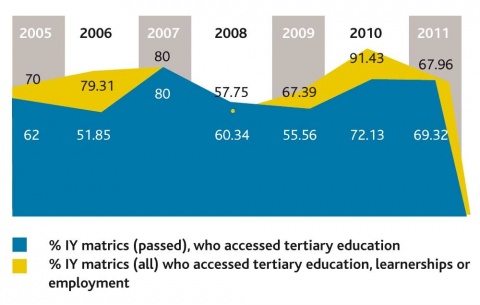
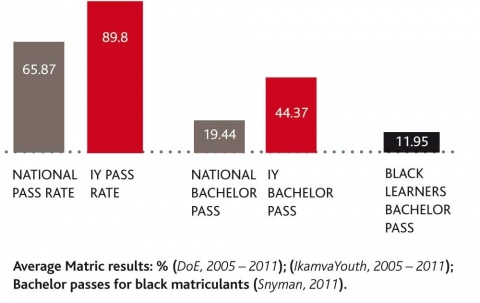
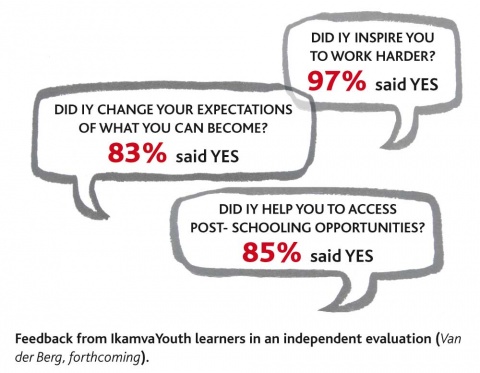

In November 2011 Masiphumelele Library in partnership with Edunova and IkamvaYouth became the recipients of an EIFL-PLIP grant.
EIFL (Electronic Information For Libraries) is an international organisation that is making a marked impact on the library world. With their slogan ‘Knowledge without Boundaries’ they are committed to developing a global network of libraries and their partners. The PLIP (Public Library Innovation Programme) grant supports innovative solutions to address socio-economic problems in developing countries.
Thanks to the grant, the Masiphumelele Library’s existing substandard computer facility will go through a dramatic transformation and will be updated with computers, projectors, printers and scanners. This new computer centre will be one of a kind in Masiphumelele and will offer an exciting space for youth to engage with technology and develop their computer skills.
The grant is not only concerned with hardware and the facility itself. EIFL is part of a global library initiative that aims to upscale the role that libraries can play in community development. To make a lasting impact in a sustainable way, EIFL promotes that libraries and their partners must advocate for themselves, to gain recognition as key players in the field of international development.
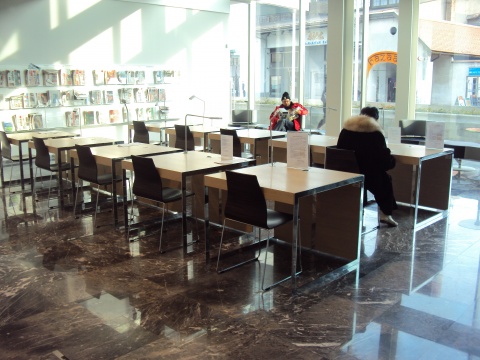
The new library at Kranj is offering innovative solutions using technology, to address societal problems
It is this that led Susan Alexander (Masiphumelele Librarian) and myself to Slovenia for a conference on Advocacy and Impact Assessment. Over the course of 4 days we under went training through the practical application of advocacy and communication strategy.

Colleagues from Estonia, Croatia, Macedonia, Kazakhstan in a discussion session
The people we met were inspiring and the skills we developed have empowered Masiphumelele Library and IkamvaYouth to embark on increased advocacy activities for the causes for which we work.
The first step is to get the centre up and running. The computers and desks are being fitted in the next 2 weeks and our facilitator, Nyasha Sithole, is undergoing intensive training, supported by Edunova. Once established, the centre opens up a range of exciting opportunities and possibilities for Ikamvanites and the wider library community.
First and foremost the centre will give all Ikamvanites direct access to a computer literacy programme. In addition the centre will engage young people in career guidance activities and assist and empower learners and the unemployed to access the workplace.
This is an exciting development for the Masiphumelele Library and IkamvaYouth is proud to be a key partner in establishing the library as a centre for community empowerment.
Keep and eye on news about the centre and the projects that will take place.
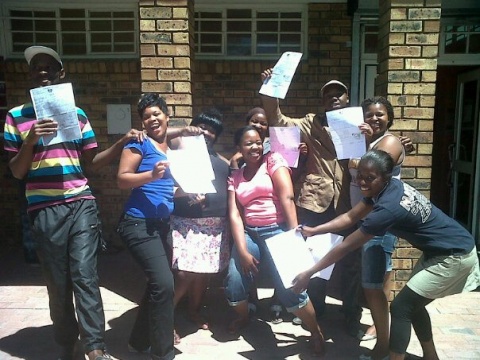

For the first time ever the Nyanga Branch has had the opportunity to experience the growth and development of the Grade 11 class of 2010 who were our very first Grade 12 class of 2011. We take joy in sharing our achievement of the 2011 Grade 12 class, who have obtained us a 93% Grade 12 pass.
Today we are proud to say, we too have seen the fruits of hard work and that the Future begins now!
Benfilda Mwindi (on the video clip) is from Zimbabwe and came to South Africa in 2008, because she had no one to look after her back at home, while her mom was very sick and her father had come to South Africa to find employment.
She is really courageous and hardworking and has surprised us time and again. Last year she lost her mother and was not able to attend the funeral in Zimbabwe, after she had been sick for a very long time but this has never been a reason for Benfilda to give up.
Anathi Malindi
At Oscar Mpetha High, Asanda Nanise and Anathi Malindi looking at his results.
Anathi has been the true evidence that hard work pays and today his mom says “I am so relieved and happy that his future is bright”. Ananthi is in the Branch Committee and also has been the Grade Head in Grade 11 at the Nyanga Branch, he is ever eager to work harder and do more for the Branch. He has assured us that this year he will be tutor of the year.
He received great news just before he received his good matric results that he has been accepted at the Cape Town University of Technology for Analytical Chemistry and his classes commence on the 17 January 2012.
Anathi received a Bachelor pass.
Yesterday her expression of joy and disbelief filled our small home with warmth.
“Ow sis’Nombu I just can’t believe this!” these where her very first words as she walked into the Nyanga office hugging her accounting tutor (Asanda Nanise, our Branch Assistant).
Benfilda passed with a Bachelor!
Masande Ndongeni
Masande’s achievement brought tears to his mom’s eyes today. On the 21 October 2011, a day before Masande’s Business Studies exam his home was burnt down to untraceable ashes while he was in the Nyanga Library studying. Everything was burnt and all they were left with is the clothes they were wearing and the books that where in his bag. His Accounting books got burnt and he had not written accounting then. With so much determination Masande never gave up but he worked even harder. His mom today expressed how grateful she is to God saying “even though our year ended so badly but I know there is hope for my family”.
Masande received a Diploma pass.
We as the Nyanga Branch are very eager to work even harder and make it our mandate to deliver the vision of Ikamva Youth to the community of Nyanga East. We have learnt that the struggles of the black child are never an excuse to not achieve his or her dreams.
A BIG thank you to all our tutors who have been the biggest supporters of the Nyanga Branch. The year has been very rocky and with never ending challenges but tutors made it their responsibility to make it to the Nyanga Library and help the Nyanga learners and today the Nyanga office would love to thank all of you and hope that we will continue the good work.
Vuyiseka Melani “it’s not just the tutoring that makes us keep on attending at Ikamva but the support and the love we receive from all tutors”.
2012 WE ARE TAKING OVER!!!!
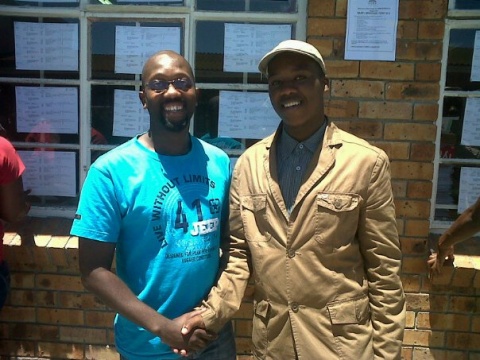

IkamvaYouth learners from township and rural schools achieve 85% pass rate; 42% of which are bachelor passes.
“Today my life begins and I’m so happy” – Anathi Malindi, Grade 12 learner from Nyanga.
Speaking on SAFM on 4th January, Graeme Bloch said that “you have to go to a model c school if you want to do well in matric”. And although the country is celebrating the 70.2% national matric pass rate, analysts agree that this figure masks the inequalities in achievement and access to tertiary study. With learners at township and rural schools severely under-performing, it appears that the higher the school fees the better one’s chances of academic achievement.
Yet IkamvaYouth’s volunteers and learners have once again shown that excellent results are possible, irrespective of which school one attends. There were 100 Grade 12 learners enrolled at IkamvaYouth in 2011, and of the 85% that passed, 42% obtained bachelor passes. This is remarkable given that only 24.3% bachelor passes were achieved nationally; the far majority by ex-model c schools. Two Western Cape branches with their first grade 12 classes did particularly well (Masiphumelele achieved 96% pass; Nyanga 93%), and the Ivory Park branch led the pack with a 100% pass rate). Overall, 70% of learners have achieved the bachelor or diploma passes they need to access tertiary education.
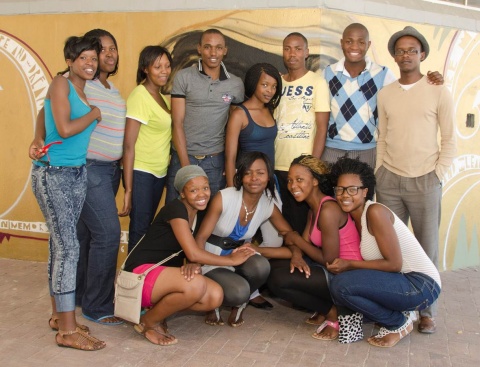
Matriculants at Makhaza Branch, Khayelitsha
IkamvaYouth sets no academic pre-requisite for enrollment in the programme. Most learners join with abysmal academic results and are from impoverished homes with unemployed caregivers. During their time with IkamvaYouth, learners dramatically improve their results, access tertiary education, and as Portia Dlamini’s mother in rural KZN hopes, will be able to “carry the family out of poverty”. Many ikamvanites excelled (25 distinctions overall) and – most importantly – many showed significant improvement. “When I joined IkamvaYouth, my third highest mark was 64%, and today I’ve achieved 5 distinctions”, said Shelton Chadya from Ivory Park. Tshepo Lesejane effectively doubled his maths literacy result (39% when he joined; he matriculated with distinction).

Gauteng Branch celebrating Matrics with Branch Coordinator Joe Manciya
Although celebrating the results, IkamvaYouth’s work with the class of 2011 is far from over. 80% of the learners who failed are eligible for supplementary exams, and tutors will ensure that they’re ready to succeed in these exams in March. While many of those who passed have already been accepted by the country’s top universities, there is still work to be done to ensure that none of the class of 2011 become unemployed. The next step is ensuring that all these learners access tertiary education, training, internships, learnerships or employment. “IkamvaYouth will continue to support all our 2011 matrics as they access quality post-school opportunities and become tutors; enabling the following years’ learners to do the same,” says director Joy Olivier.
The tutors who help the learners to reach these heights are all volunteers. Most are university students and many are ex-learners from IkamvaYouth. They’re also the organisation’s greatest benefactors: next year, ikamvanites will be delivering the equivalent of over 3 million rands’ worth of tutoring time to learners in seven communities in three provinces. The result of this phenomenal investment is an intensive, high quality programme that offers ongoing individual attention and support to learners for under R4500 per learner per year.
As well as our volunteers gratitude must be extended to our funders and donors. In particular IkamvaYouth is especially grateful to the DG Murray Trust, EMpower, the Raimondo Trust, the Potter foundation, the Answer Series, ABI, Hatch, African Bank, Cato Manor ABM, AME Africa, the Anglo Chairman’s Fund, SEF, TSiBA, UWC, DUT, Department of Libraries and Information Science, Learning Trust, Bertha Foundation, Dietschweiler Stiftung, the Foschini Group, iKineo, Education Without Borders, World Teach, Zonke Monitoring Systems, and Capitec Bank for their vital contributions this past year. A great shout big shout out also goes to the countless individuals whose time and money has ensured that IkamvaYouth not only continues to operate in challenging economic times, but can grow and expand its reach and impact.
When announcing the results, the Minister of Basic Education pronounced the eradication of inequality a national priority. IkamvaYouth invites everyone to get involved in transforming our nation, one shining future at a time. IkamvaYouth has branches in the Western Cape (Khayelitsha, Nyanga and Masiphumelele); KZN (Chesterville and a new branch opening in Umlazi) and Gauteng (Ivory Park, and a new branch opening in Ebony Park). IkamvaYouth has maintained a matric pass rate of between 83 and 100% each year since 2005, and true credit for these results must go to the learners, volunteers, the branch teams, and the donors.
Congratulations Class of 2011!



















 Lloyd Lungu
Lloyd Lungu